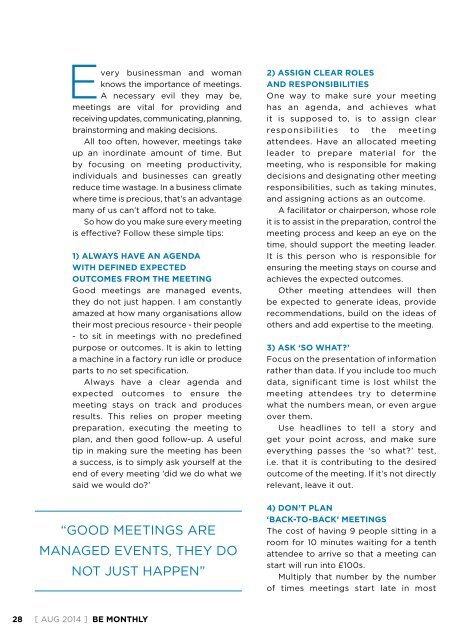Nickel in demand
Create successful ePaper yourself
Turn your PDF publications into a flip-book with our unique Google optimized e-Paper software.
Every bus<strong>in</strong>essman and woman<br />
knows the importance of meet<strong>in</strong>gs.<br />
A necessary evil they may be,<br />
meet<strong>in</strong>gs are vital for provid<strong>in</strong>g and<br />
receiv<strong>in</strong>g updates, communicat<strong>in</strong>g, plann<strong>in</strong>g,<br />
bra<strong>in</strong>storm<strong>in</strong>g and mak<strong>in</strong>g decisions.<br />
All too often, however, meet<strong>in</strong>gs take<br />
up an <strong>in</strong>ord<strong>in</strong>ate amount of time. But<br />
by focus<strong>in</strong>g on meet<strong>in</strong>g productivity,<br />
<strong>in</strong>dividuals and bus<strong>in</strong>esses can greatly<br />
reduce time wastage. In a bus<strong>in</strong>ess climate<br />
where time is precious, that’s an advantage<br />
many of us can’t afford not to take.<br />
So how do you make sure every meet<strong>in</strong>g<br />
is effective? Follow these simple tips:<br />
1) Always have an agenda<br />
with def<strong>in</strong>ed expected<br />
outcomes from the meet<strong>in</strong>g<br />
Good meet<strong>in</strong>gs are managed events,<br />
they do not just happen. I am constantly<br />
amazed at how many organisations allow<br />
their most precious resource - their people<br />
- to sit <strong>in</strong> meet<strong>in</strong>gs with no predef<strong>in</strong>ed<br />
purpose or outcomes. It is ak<strong>in</strong> to lett<strong>in</strong>g<br />
a mach<strong>in</strong>e <strong>in</strong> a factory run idle or produce<br />
parts to no set specification.<br />
Always have a clear agenda and<br />
expected outcomes to ensure the<br />
meet<strong>in</strong>g stays on track and produces<br />
results. This relies on proper meet<strong>in</strong>g<br />
preparation, execut<strong>in</strong>g the meet<strong>in</strong>g to<br />
plan, and then good follow-up. A useful<br />
tip <strong>in</strong> mak<strong>in</strong>g sure the meet<strong>in</strong>g has been<br />
a success, is to simply ask yourself at the<br />
end of every meet<strong>in</strong>g ‘did we do what we<br />
said we would do?’<br />
“Good meet<strong>in</strong>gs are<br />
managed events, they do<br />
not just happen”<br />
2) Assign clear roles<br />
and responsibilities<br />
One way to make sure your meet<strong>in</strong>g<br />
has an agenda, and achieves what<br />
it is supposed to, is to assign clear<br />
responsibilities to the meet<strong>in</strong>g<br />
attendees. Have an allocated meet<strong>in</strong>g<br />
leader to prepare material for the<br />
meet<strong>in</strong>g, who is responsible for mak<strong>in</strong>g<br />
decisions and designat<strong>in</strong>g other meet<strong>in</strong>g<br />
responsibilities, such as tak<strong>in</strong>g m<strong>in</strong>utes,<br />
and assign<strong>in</strong>g actions as an outcome.<br />
A facilitator or chairperson, whose role<br />
it is to assist <strong>in</strong> the preparation, control the<br />
meet<strong>in</strong>g process and keep an eye on the<br />
time, should support the meet<strong>in</strong>g leader.<br />
It is this person who is responsible for<br />
ensur<strong>in</strong>g the meet<strong>in</strong>g stays on course and<br />
achieves the expected outcomes.<br />
Other meet<strong>in</strong>g attendees will then<br />
be expected to generate ideas, provide<br />
recommendations, build on the ideas of<br />
others and add expertise to the meet<strong>in</strong>g.<br />
3) Ask ‘So what?’<br />
Focus on the presentation of <strong>in</strong>formation<br />
rather than data. If you <strong>in</strong>clude too much<br />
data, significant time is lost whilst the<br />
meet<strong>in</strong>g attendees try to determ<strong>in</strong>e<br />
what the numbers mean, or even argue<br />
over them.<br />
Use headl<strong>in</strong>es to tell a story and<br />
get your po<strong>in</strong>t across, and make sure<br />
everyth<strong>in</strong>g passes the ‘so what?’ test,<br />
i.e. that it is contribut<strong>in</strong>g to the desired<br />
outcome of the meet<strong>in</strong>g. If it’s not directly<br />
relevant, leave it out.<br />
4) Don’t plan<br />
‘back-to-back’ meet<strong>in</strong>gs<br />
The cost of hav<strong>in</strong>g 9 people sitt<strong>in</strong>g <strong>in</strong> a<br />
room for 10 m<strong>in</strong>utes wait<strong>in</strong>g for a tenth<br />
attendee to arrive so that a meet<strong>in</strong>g can<br />
start will run <strong>in</strong>to £100s.<br />
Multiply that number by the number<br />
of times meet<strong>in</strong>gs start late <strong>in</strong> most<br />
28<br />
[ Aug 2014 ] BE Monthly





